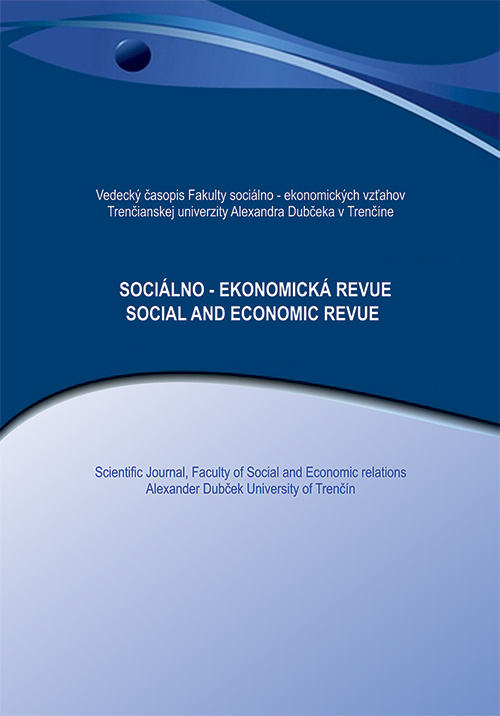SLOVAK SMES FACING NEW CHALLENGES (WITH AN EMPHASIS ON THE IMPLEMENTATION OF ARTIFICIAL INTELLIGENCE)
Today's small and medium-sized enterprises (SMEs) face many challenges associated with the implementation of artificial intelligence (AI), which offers a wide range of opportunities to improve efficiency, competitiveness and sustainability. Currently, there are a number of diverse factors affecting the operations of SMEs in Slovakia, and these factors can be divided into general ones, which affect SMEs regardless of the sector in which they operate, and specific ones, which take into account sector specificities. In the context of AI implementation, these factors are determined by the state of knowledge, the sector of AI implementation and the relationships of AI implementation to other environmental factors that determine the consequences. The aim of this paper is to explore the opportunities and challenges of AI implementation in Slovak SMEs, and based on the obtained information, to propose a framework for AI implementation in these enterprises. The conclusion of the article is that proper implementation of AI can help SMEs gain strategic advantage, but as it brings benefits it also brings risks that need to be faced.
Release: 2024/1 Pages: 13-21 JEL classification: O33, O39
DOI: https://doi.org/10.52665/ser20240102
Keywords: artificial intelligence, Slovak SMEs, new challenges, benefits, risks
Section:
Contacts:
Jozef Klučka, assoc. prof., Ing., PhD.
University of Žilina
Faculty of Security Engineering
Univerzitná 8215/1, 010 26 Žilina, Slovak republic
e-mail: jozef.klucka@fsi.uniza.sk
Lukrécia Hunková, Ing.
Alexander Dubček University of Trenčín
Faculty of Social and Economic Relations
Študentská 3, 911 50 Trenčín, Slovak republic
email: lukrecia.hunkova@tnuni.sk
Literature:
Adib-Moghaddam, Arshin. 2021. ‘Artificial intelligence must not be allowed to replace the imperfection of human empathy’. The Conversation. Retrieved 5 September 2024 (http://theconversation.com/artificial-intelligence-must-not-be-allowed-to-replace-the-imperfection-of-human-empathy-151636).
Agrawal, Ankita. 2024. ‘Ethical considerations for SMEs using AI technology’. SME Magazine. Retrieved 5 September 2024 (https://www.smeweb.com/ethical-considerations-for-smes-using-ai-technology/).
Agrawal, Parul, Kamal Ahmad, Ajay Kumar, and Anoop Pandey. 2024. ‘Adoption Of Artificial Intelligent Technologies In SMEs Sector’. Journal of Mountain Research 19(1). doi: 10.51220/jmr.v19-i1.40.
Ali Mohamad, Talal, Anna Bastone, Fabian Bernhard, and Francesco Schiavone. 2023. ‘How Artificial Intelligence Impacts the Competitive Position of Healthcare Organizations’. Journal of Organizational Change Management 36(8):49–70. doi: 10.1108/JOCM-03-2023-0057.
Anon. 2023. ‘Navigating Nuances: The Challenge of AI in Proposal Understanding’. HINZ Consulting. Retrieved 5 September 2024 (https://hinzconsulting.com/navigating-nuances-the-challenge-of-ai-in-proposal-understanding/).
Anon. 2024a. ‘AI for Customer Insights: Unlocking the Power of Data’. Peekage. Retrieved 5 September 2024 (https://peekage.com/blog/ai-for-customer-insights).
Anon. 2024b. ‘How responsible AI can help spark new levels of creativity’. Business Insider. Retrieved 5 September 2024 (https://www.businessinsider.com/sc/how-responsible-ai-can-help-spark-new-levels-of-creativity).
Anon. 2024c. ‘Object Detection for Images: Technologies, Applications, and Best Solutions’. api4ai. Retrieved 5 September 2024 (https://api4.ai/blog/object-detection-for-images-technologies-applications-and-best-solutions).
Bakiner, Onur. 2023. ‘The Promises and Challenges of Addressing Artificial Intelligence with Human Rights’. Big Data & Society 10(2):20539517231205476. doi: 10.1177/20539517231205476.
Borah, Samarjeet, Chukwuma Kama, Sandip Rakshit, and Narasimha Rao Vajjhala. 2022. ‘Applications of Artificial Intelligence in Small- and Medium-Sized Enterprises (SMEs)’. Pp. 717–26 in Cognitive Informatics and Soft Computing. Vol. 375, Lecture Notes in Networks and Systems, edited by P. K. Mallick, A. K. Bhoi, P. Barsocchi, and V. H. C. De Albuquerque. Singapore: Springer Nature Singapore.
Bourdin, Mathieu, Thomas Paviot, Robert Pellerin, and Samir Lamouri. 2024. ‘NLP in SMEs for Industry 4.0: Opportunities and Challenges’. Procedia Computer Science 239:396–403. doi: 10.1016/j.procs.2024.06.186.
Chen, Chi-hsiang. 2024. ‘Influence of Employees’ Intention to Adopt AI Applications and Big Data Analytical Capability on Operational Performance in the High-Tech Firms’. Journal of the Knowledge Economy 15(1):3946–74. doi: 10.1007/s13132-023-01293-x.
Esmaeilzadeh, Pouyan. 2024. ‘Challenges and Strategies for Wide-Scale Artificial Intelligence (AI) Deployment in Healthcare Practices: A Perspective for Healthcare Organizations’. Artificial Intelligence in Medicine 151:102861. doi: 10.1016/j.artmed.2024.102861.
Gînguță, Andrea, Petru Ștefea, Grațiela Georgiana Noja, and Valentin Partenie Munteanu. 2023. ‘Ethical Impacts, Risks and Challenges of Artificial Intelligence Technologies in Business Consulting: A New Modelling Approach Based on Structural Equations’. Electronics 12(6):1462. doi: 10.3390/electronics12061462.
Haleem, Abid, Mohd Javaid, Ibrahim Haleem Khan, and Sanjay Mohan. 2023. ‘Significant Applications of Artificial Intelligence Towards Attaining Sustainability’. Journal of Industrial Integration and Management 08(04):489–520. doi: 10.1142/S2424862223500331.
Hamilton, Sarah. 2023. ‘Understanding the Perks of Predictive Analytics in Risk Management Insights’. 360factors. Retrieved 5 September 2024 (https://www.360factors.com/blog/understanding-perks-predictive-analytics-risk-management-insights/).
Harrisová, Sarah. 2024. ‘How Small Businesses Can Utilize Artificial Intelligence and Machine Learning for Enhanced Security | Blog | Workast’. Retrieved 5 September 2024 (https://www.workast.com/blog/how-small-businesses-can-utilize-artificial-intelligence-and-machine/).
Hassan, Aiman O. 2024. ‘The Power of AI: Automating Repetitive Tasks in Businesses’. Retrieved 5 September 2024 (https://www.linkedin.com/pulse/power-ai-automating-repetitive-tasks-businesses-aiman-o-hassan-rggjf/).
Havierniková, Katarína. 2023. Industry 4.0 for Small and Medium-Sized Enterprises within the Agricultural Sector: Human Resources Focus: Scientific Monograph. First edition. Szczecin: Centre of Sociological Research.
Hussain, Atif, and Rana Rizwan. 2024. Strategic AI Adoption in SMEs: A Prescriptive Framework.
Jaloliddin, Rahmonov. 2023. ‘Digitalization in Global Trade: Opportunities and Challenges for Investment’. Global Trade and Customs Journal 18(Issue 10):391–95. doi: 10.54648/GTCJ2023043.
Ključnikov, Aleksandr, Ladislav Mura, and David Sklenár. 2019. ‘Information Security Management in SMEs: Factors of Success’. Entrepreneurship and Sustainability Issues 6(4):2081–94. doi: 10.9770/jesi.2019.6.4(37).
Kovič, Klemen, Polona Tominc, Jasna Prester, and Iztok Palčič. 2024. ‘Artificial Intelligence Software Adoption in Manufacturing Companies’. Applied Sciences 14(16):6959. doi: 10.3390/app14166959.
Liu, Yulong (David), Jishuo Sun, Zuopeng (Justin) Zhang, Mian Wu, Herbert Sima, and Yat Ming Ooi. 2024. ‘How AI Impacts Companies’ Dynamic Capabilities: Lessons from Six Chinese Construction Firms’. Research-Technology Management 67(3):64–76. doi: 10.1080/08956308.2024.2324407.
Lviv Polytechnic National University, Oksana Svatiuk, A. Zaharets, Lviv Polytechnic National University, Y. Sytnyk, and Lviv Polytechnic National University. 2022. ‘Digitization of Managerial Work of HR-Manager’. Management and Entrepreneurship in Ukraine: The Stages of Formation and Problems of Development 2022(2):210–22. doi: 10.23939/smeu2022.02.210.
Manyika, James, and Kevin Sneader. 2018. ‘AI, Automation, and the Future of Work: Ten Things to Solve For’. McKinsey Global Institute. Retrieved 6 September 2024 (https://www.mckinsey.com/featured-insights/future-of-work/ai-automation-and-the-future-of-work-ten-things-to-solve-for).
Papagiannidis, Emmanouil, Patrick Mikalef, Kieran Conboy, and Rogier Van De Wetering. 2023. ‘Uncovering the Dark Side of AI-Based Decision-Making: A Case Study in a B2B Context’. Industrial Marketing Management 115:253–65. doi: 10.1016/j.indmarman.2023.10.003.
Quinonez, Claudia, and Edgar Meij. 2024. ‘A New Era of AI‐assisted Journalism at Bloomberg’. AI Magazine 45(2):187–99. doi: 10.1002/aaai.12181.
Sharma, Shavneet, Gurmeet Singh, Nazrul Islam, and Amandeep Dhir. 2024. ‘Why Do SMEs Adopt Artificial Intelligence-Based Chatbots?’ IEEE Transactions on Engineering Management 71:1773–86. doi: 10.1109/TEM.2022.3203469.
Šelestiaková, K. (2023). Brigita Schmögner for HN. Retrieved from https://hnonline.sk/slovensko/96060137-brigita-schmoegnerova-pre-hn-robert-fico-socialnu-demokraciu-do-znacnej-miery-zdiskreditoval
Šimová, Stanislava. 2023. ‘What is AI marketing?’ Vivantina. Retrieved 5 September 2024 (https://www.vivantina.com/blog/co-je-ai-marketing/).
Skrypka, Illya. 2023. 'Unleashing the Potential of Artificial Intelligence in PR: How Artificial Intelligence is Changing the Public Relations Environment'. Retrieved 5 September 2024 (https://prnews.io/sk/blog/ako-umela-inteligencia-zmeni-polieverejnych-vztahov.html).
Szumilo, Nikodem, and Thomas Wiegelmann. 2024. ‘Real Estate Insights AI: Real Estate’s New Roommate – the Good, the Bad and the Algorithmic’. Journal of Property Investment & Finance 42(2):211–17. doi: 10.1108/JPIF-01-2024-0001.
Tian, Ming, Jiarui Yan, and Xiaotong Li. 2024. ‘Anthropomorphism of Service-Oriented AI and Customers’ Propensity for Value Co-Creation’. Marketing Intelligence & Planning. doi: 10.1108/MIP-08-2023-0388.
Uduma, Igwe, Humble Otamiri, and Imah Andrew. 2023. Impact of artificial intelligence (ai) applicability in the optimization of manufacturing processes in SMEs within Ebonyi state, Nigeria.
Ünver, H. Akin. n.d. ‘Artificial Intelligence (AI) and Human Rights: Using AI as a Weapon of Repression and Its Impact on Human Rights’.
Varma, Arup, Cedric Dawkins, and Kaushik Chaudhuri. 2023. ‘Artificial Intelligence and People Management: A Critical Assessment through the Ethical Lens’. Human Resource Management Review 33(1):100923. doi: 10.1016/j.hrmr.2022.100923.
Wach, Krzysztof, Cong Doanh Duong, Joanna Ejdys, Rūta Kazlauskaitė, Pawel Korzynski, Grzegorz Mazurek, Joanna Paliszkiewicz, and Ewa Ziemba. 2023. ‘The Dark Side of Generative Artificial Intelligence: A Critical Analysis of Controversies and Risks of ChatGPT’. Entrepreneurial Business and Economics Review 11(2):7–30. doi: 10.15678/EBER.2023.110201.


